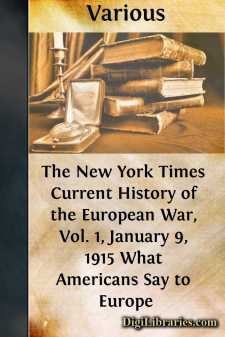Categories
- Antiques & Collectibles 13
- Architecture 36
- Art 48
- Bibles 22
- Biography & Autobiography 813
- Body, Mind & Spirit 142
- Business & Economics 28
- Children's Books 17
- Children's Fiction 14
- Computers 4
- Cooking 94
- Crafts & Hobbies 4
- Drama 346
- Education 46
- Family & Relationships 57
- Fiction 11829
- Games 19
- Gardening 17
- Health & Fitness 34
- History 1377
- House & Home 1
- Humor 147
- Juvenile Fiction 1873
- Juvenile Nonfiction 202
- Language Arts & Disciplines 88
- Law 16
- Literary Collections 686
- Literary Criticism 179
- Mathematics 13
- Medical 41
- Music 40
- Nature 179
- Non-Classifiable 1768
- Performing Arts 7
- Periodicals 1453
- Philosophy 64
- Photography 2
- Poetry 896
- Political Science 203
- Psychology 42
- Reference 154
- Religion 513
- Science 126
- Self-Help 84
- Social Science 81
- Sports & Recreation 34
- Study Aids 3
- Technology & Engineering 59
- Transportation 23
- Travel 463
- True Crime 29
The New York Times Current History of the European War, Vol. 1, January 9, 1915 What Americans Say to Europe
by: Various
Description:
Excerpt
In the Supreme Court of Civilization
Argued by James M. Beck.
THE NEW YORK TIMES submitted the evidence contained in the official "White Paper" of Great Britain, the "Orange Paper" of Russia, and the "Gray Paper" of Belgium to James M. Beck, late Assistant Attorney General of the United States and a leader of the New York bar, who has argued many of the most important cases before the Supreme Court. On this evidence Mr. Beck has argued in the following article the case of Dual Alliance vs. Triple Entente. It has been widely circulated in France and Great Britain.
Let us suppose that in this year of dis-Grace, Nineteen Hundred and Fourteen, there had existed, as let us pray will one day exist, a Supreme Court of Civilization, before which the sovereign nations could litigate their differences without resort to the iniquitous and less effective appeal to the arbitrament of arms.
Let us further suppose that each of the contending nations had a sufficient leaven of Christianity to have its grievances adjudged not by the ethics of the cannon or the rifle, but by the eternal criterion of justice.
What would be the judgment of that august tribunal?
Any discussion of the ethical merits of this great controversy must start with the assumption that there is an international morality.
This fundamental axiom, upon which the entire basis of civilization necessarily rests, is challenged by a small class of intellectual perverts.
Some hold that moral considerations must be subordinated either to military necessity or so-called manifest destiny. This is the Bernhardi doctrine.
Others teach that war is a beneficent fatality and that all nations engaged in it are therefore equally justified. On this theory all of the now contending nations are but victims of an irresistible current of events, and the highest duty of the State is to prepare itself for the systematic extermination, when necessary or expedient, of its neighbors.
Notwithstanding the clever platitudes under which both these doctrines are veiled, all morally sane minds are agreed that this war is a great crime against civilization, and the only open question is, which of the two contending groups of powers is morally responsible for that crime?
Was Austria justified in declaring war against Servia?
Was Germany justified in declaring war against Russia and France?
Was England justified in declaring war against Germany?
As the last of these questions is the most easily disposed of, it may be considered first.
England's justification rests upon the solemn Treaty of 1839, whereby Prussia, France, England, Austria, and Russia "became the guarantors" of the "perpetual neutrality" of Belgium, as reaffirmed by Count Bismarck, then Chancellor of the North German Confederation, on July 22, 1870, and as even more recently reaffirmed in the striking fact disclosed in the Belgian "Gray Book."
In the Spring of 1913 a debate was in progress in the Budget Committee of the Reichstag with reference to the Military Budget. In the course of the debate the German Secretary of State said:
"The neutrality of Belgium is determined by international conventions, and Germany is resolved to respect these conventions."
To confirm this solemn assurance, the Minister of War added in the same debate:
"Belgium does not play any part in the justification of the German scheme of military reorganization....












